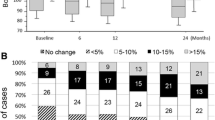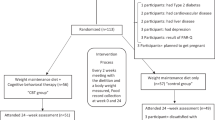Abstract
OBJECTIVE: This study is aimed at the comparison between an individual and a group cognitive-behavioral program for the treatment of obesity. DESIGN: Parallel series, prospective, —year study. A group program of 10 weekly sessions focused on lifestyle modification was compared with a similar, individual 10-session program. Fifty-seven patients were assigned to individual treatment, and 84 patients to the group program. SUBJECTS: Onehundred- forty-one obese female outpatients without binge eating disorder, aged 42.0±11.6 years (m±SD), with Body Mass Index (BMI) 37.3±5.2 kg/m2. MEASUREMENTS: BMI and waist circumference were measured at 0, 6, 12 and 36 months. Analysis was performed on an intention-to-treat basis. RESULTS: Mean weight loss was superior with the group program at 6 months (2.0±3.9 vs 0.8±2.5 kg/m2; p<0.05), while no difference between the two treatments was observed at 12 and 36 months. Mean waist circumference was significantly different at 6 months (group 97.4±2.5 vs individual 102.9±2.4, p<0.05), still remaining superior in the patients following individual treatment (100.2±5.0 vs 103.7±5.9) at 12 months, while no difference between the two treatments was observed at 36 months. The proportion of patients losing more than 5% of initial body weight with the group program (16.6, 15.5, and 38.1% at 6, 12, and 36 months, respectively) was not significantly different from that observed with individual treatment (5.3, 14.0, and 35.0%, respectively). CONCLUSION: A group cognitivebehavioral program for the treatment of obesity is not inferior to a similar program applied in individual setting, and it may enhance weight loss (especially fat mass, according to the waist measurement) in the short term.
Similar content being viewed by others
References
Wing R.R., Blair E., Marcus M., Epstein L.K., Harvey J.: Year-long weight loss treatment for obese patients with type II diabetes: does inclusion of intermittent very low calorie diet improve outcome? Am. J. Med., 97, 354–362, 1994.
Wadden T.A., Sarwer D.B.: Behavioral treatment of obesity: new approaches to an old disorder. In: Goldstein D.J. (Ed.), The Management of Eating Disorder and Obesity. Totowa, New Jersey, Humana Press, 1999, pp. 173–199.
Jeffrey R., Wing R., Burton L., Raether C., Harvey J., Mullen M.: Strengthening behavioral interventionts for weight loss: a randomized trial of food provision and monetary incentives. J. Consult. Clin. Psychol., 61, 1038–1045, 1993.
Wadden T.A., Foster G.D., Letizia K.A.: One-year behavioral treatment of obesity: comparison of moderate and severe restriction and the effects of weight maintenance therapy. J. Consult. Clin. Psychol., 62, 165–171, 1994.
Agras W.S., Berkowitz R.I., Arnow B.A., Telch C.F., Marnell M., Henderson J., Morris Y., Wilfley D.E.: Maintenance following a very-low calorie diet. J. Consult. Clin. Psychol., 64, 610–613, 1996.
Cooper Z., Faiburn C.G.: A new cognitive behavioral approach to the treatment of obesity. Behav. Res. Ther., 39, 499–511, 2001.
January M.O.C., Gay N.: The circle of effective communication in patient education. In: Assal J.P., Berger M., Gay N., Canivet J. (Eds.), Diabetes Education. How to improve patients’education. Amsterdam, Excerpta Medica, 1983, pp. 121–129.
Wadden T.A., Osei S.: The treatment of obesity: an overview. In: Wadden T.A., Stunkard A.J. (Eds.), Handbook of obesity treatment. New York, The Guilford Press, 2002, pp. 229–248.
Heller S.R., Clarke P., Daly H., Davis I., Mc Culloch D.K., Allison S.P., Tattersall R.B.: Group education for obese patients with type 2 diabetes: greater success at less cost. Diabet. Med., 5, 552–556, 1988.
Basler H., Brinkmeier U., Buser K., Haehn K., Mölders-Kober R.: Psychological group treatment of essential hypertension in general practice. Br. J. Clin. Phychol., 21, 295–302, 1982.
Hayaki J., Brownel K.D.: Behaviour change in practice: group approaches. Int. J. Obes., 20, Suppl 1, S27–S30, 1996.
Fawzy F.I.: Psychotherapy as an adjunt to supervised fasting for obesity. Psychosomatics, 25, 821–829, 1984.
Hakala P., Karvetti R.l., Ronnemaa T.: Group vs individual weight reduction programmes in the treatment of severe obesity — a five years follow up study. Int. J. Obes., 17, 97–102, 1993.
Prochaska J.O., Di Clemente C.C., Norcross J.C.: In search of how people change. Am. Psychol., 47, 1102–1114, 1992.
Ferster C.B., Nurnberger J.I., Levitt E.B.: The control of eating. J. Mathetics 1, 87–109, 1962.
Stuart R.B.: Behavioral control of overeating. Behav. Res. Ther., 5, 357–365, 1967.
D’Zurilla T.J., Goldfried M.R.. Problem solving and behavior modification. J. Abnorm. Psychol., 78, 107–126, 1971.
Marlatt G.A.: Relapse prevention: theoretical rationale and overview of the model. In: Marlatt G.A., Gordon J.R. (Eds.), Relapse Prevention. New York, Guilford Press, 1995, pp. 3–67.
Marchesini G., Natale S., Chierici S., Manini R., Besteghi L., Di Domizio S., Sartini A., Pasqui F., Baraldi L., Forlani G., Melchionda N.: Effects of cognitive- behavioural therapy on health-related quality of life in obese subjects with and without binge eating disorder. Int. J. Obes. Relat. Metab. Disord., 26, 1261–1267, 2002.
Hakala P.: Weight reduction programmes at a rehabilitation centre and a health centre based on group counselling and individual support: short- and long-term follow-up study. Int. J. Obes. Relat. Metab. Disord., 18, 483–489, 1994.
Griffiths R.A., Holliday J.: An evaluation and follow-up investigation of a behavioural group treatment programme for obesity. Psychother. Psychosom., 48, 157–164, 1987.
Renjilian D.A., Perri M.G., Nezu A.M., McKelvey W.F., Shermer R.L., Anton S.D.: Individual versus group therapy for obesity: effects of matching participants to their treatment preferences. J. Consult. Clin. Psychol., 69, 717–721, 2001.
Wadden T.A., Frey D.L.: A multicenter evaluation of a proprietary weight loss program for the treatment of marked obesity: a five-year follow-up. Int. J. Eat. Disord., 22, 203–212, 1997.
Wing R.R., Jeffery R.W., Burton L.R., Yhorson C., Sperber Nissinoff K., Baxter J.E.: Food provision vs structured meal plans in the behavioural treatment of obesity. Int. J. Obes., 20, 56–62, 1996.
Schmitz K.H., Jensen M.D., Kugler K.C., Jeffery R.W., Leon A.S.. Strength training for obesity prevention in midlife women. Int. J. Obes. Relat. Metab. Disord., 27, 326–333, 2003.
Perri M.G.: The maintenance of treatment effects in the long-term management of obesity. Clin. Psychol. Sci. Pract., 5, 526–543, 1998.
Foreyt J.P., Goodrick G.K., Reeves R.S., Raynaud A.S., Darnell L., Brown A.H., Gotto A.M.: Response of freeliving adults to behavioural treatment of obesity attrition and compliance to exercise. Behav. Ther., 24, 659–669, 1993.
McGuire M.T., Wing R.R., Klem M.L., Lang W., Hill J.O.: What predicts weight regain in a group of successful weight losers? J. Consult. Clin. Psychol., 67, 177–185, 1999.
Pronk N.P., Wing R.R.: Physical activity and long-term maintenance of weight loss. Obes. Res., 2, 587–599, 1994.
Author information
Authors and Affiliations
Corresponding author
Rights and permissions
About this article
Cite this article
Cresci, B., Tesi, F., La Ferlita, T. et al. Group versus individual cognitive-behavioral treatment for obesity: Results after 36 months. Eat Weight Disord 12, 147–153 (2007). https://doi.org/10.1007/BF03327591
Received:
Accepted:
Published:
Issue Date:
DOI: https://doi.org/10.1007/BF03327591




